大学英语语法二
大学英语(2)知识点总结
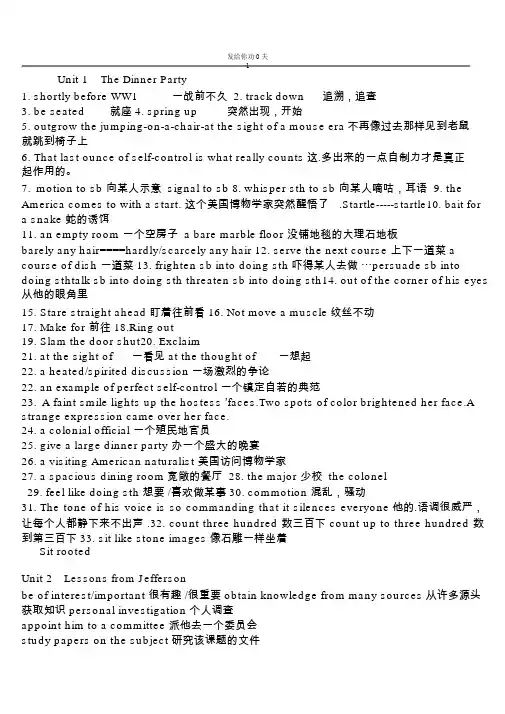
Unit 1The Dinner Party1. shortly before WW1一战前不久2. track down追溯,追查3. be seated就座4. spring up突然出现,开始5.outgrow the jumping-on-a-chair-at the sight of a mouse era不再像过去那样见到老鼠就跳到椅子上6.That last ounce of self-control is what really counts这.多出来的一点自制力才是真正起作用的。
7.motion to sb 向某人示意 signal to sb 8. whisper sth to sb 向某人嘀咕,耳语 9. the America comes to with a start. 这个美国博物学家突然醒悟了.Startle-----startle10. bait fora snake 蛇的诱饵11. an empty room 一个空房子 a bare marble floor 没铺地毯的大理石地板barely any hair====hardly/scarcely any hair 12. serve the next course 上下一道菜 a course of dish 一道菜 13. frighten sb into doing sth吓得某人去做⋯persuade sb into doing sthtalk sb into doing sth threaten sb into doing sth14. out of the corner of his eyes 从他的眼角里15.Stare straight ahead 盯着往前看 16. Not move a muscle纹丝不动17.Make for 前往 18.Ring out19.Slam the door shut20. Exclaim21. at the sight of一看见at the thought of一想起22. a heated/spirited discussion一场激烈的争论22.an example of perfect self-control 一个镇定自若的典范23.A faint smile lights up the hostess ’faces.Two spots of color brightened her face.A strange expression came over her face.24.a colonial official 一个殖民地官员25.give a large dinner party 办一个盛大的晚宴26.a visiting American naturalist 美国访问博物学家27.a spacious dining room宽敞的餐厅 28. the major 少校 the colonel29.feel like doing sth 想要 /喜欢做某事 30. commotion 混乱,骚动31.The tone of his voice is so commanding that it silences everyone他的.语调很威严,让每个人都静下来不出声 .32. count three hundred 数三百下 count up to three hundred 数到第三百下 33. sit like stone images像石雕一样坐着Sit rootedUnit 2Lessons from Jeffersonbe of interest/important 很有趣 /很重要 obtain knowledge from many sources从许多源头获取知识 personal investigation个人调查appoint him to a committee 派他去一个委员会study papers on the subject研究该课题的文件make on-the-spot observations做现场观察By birth and by education Jefferson belonged to the highest social class无论.是论出身还是论教育,杰弗逊都属于最高的社会阶层.noble persons 贵族 persons of noble origins出身高贵的人 persons of humble origins出身卑微的人go out of one’ s way to do特sth意/专门去做某事 a cooking pot 做饭的锅If you will only do this, you may find out why people are dissatisfied如.果也只有你愿意这样做,你才可能发现为什么人民不满意.Heaven has given you a mind for judging truth and error. Use it上.帝赋予你一个判断正确和错误的头脑,就运用它吧 .form a correct judgment 形成正确的判断not hesitate a moment to do sth 毫不犹豫地去做某事the former and the latter 前者和后者In a free country, there will always be conflicting ideas, and this is a source of strength在一.个自由的国度,总会有冲突的意见,而这正是力量的源泉.It is conflict and not unquestioning agreement that keeps freedom alive让.自由保持活力的是冲突而不是绝对的一致.There are two sides to every question. If you take one side with effect, those who take the other side will of course resent your actions.每个问题都有两面.如果你有力地站在一方,那么另一方的人必定会憎恨你的行动.be chained to customs受习俗的禁锢 lose its usefulness失去它的效用 No society can make a perpetual constitution, or even a perpetual law. 任何一个社会都不能制定出永久的宪法或永久的法律 .He didn ’ t fear new ideas, nor did he fear the future他不.惧怕新观点,也不惧怕未来.I steermy ship with hope, leaving fear behind我.满怀希望驾驶着帆船,把恐惧抛在身后.be based on knowledge 以知识为基石men of his age===peer 同龄人practice crop rotation and soil conservation施行作物轮作和土壤保持standard practice 标准的做法 be superior to any other in existence比现存的任何做法都优越be inferior to 不如⋯Of all Jefferson’ s many talents, one is central.在杰弗逊的诸多才能中,其中一个是重要的.He was above all a good and tireless writer. 首先,他是个优秀的不知疲倦的作家.Ageless-----parentless-----timeless31. complete works全集32. when the time came to do sth当该做⋯的时候33. the taskof writing it was his. 撰写的任务都落在他的肩头了.34. We hold those truths to be self-evident, that all men are created equal.]我们坚信这些不言而喻的事实:人人生而平等.Every is born equal.35. He left his countrymen a rich legacy of ideas and examples.他给他的同胞留下一笔丰富的思想遗产和范例.36.owe a great debt to 归功于⋯. ====Be indebted to37.Only a nation of educated people could remain free. 只有一个由受教育的人民组成的国度才能保持自由 .Unit 3My First Jobapply for a teaching job 申请一份教学工作 go from bad to worse 每况愈下enter university 进入大学 in a suburb of London 在伦敦的郊区be very short of money 手头很紧Without a degree and with no experience in teaching, my chances of getting this job were slim. 一无学历,二无教学经历,我得到可能性是微乎其微 .Chances of doing are/were做⋯⋯某事的机会是⋯⋯It proved an awkward journey. 这一路原来真是麻烦。
大二常用语法知识点
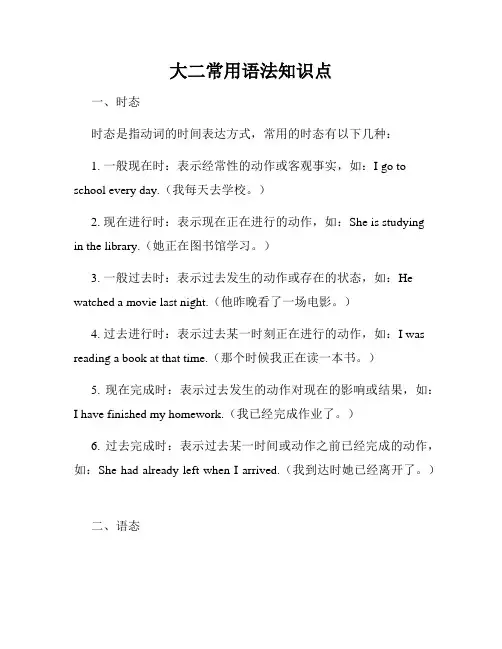
大二常用语法知识点一、时态时态是指动词的时间表达方式,常用的时态有以下几种:1. 一般现在时:表示经常性的动作或客观事实,如:I go to school every day.(我每天去学校。
)2. 现在进行时:表示现在正在进行的动作,如:She is studying in the library.(她正在图书馆学习。
)3. 一般过去时:表示过去发生的动作或存在的状态,如:He watched a movie last night.(他昨晚看了一场电影。
)4. 过去进行时:表示过去某一时刻正在进行的动作,如:I was reading a book at that time.(那个时候我正在读一本书。
)5. 现在完成时:表示过去发生的动作对现在的影响或结果,如:I have finished my homework.(我已经完成作业了。
)6. 过去完成时:表示过去某一时间或动作之前已经完成的动作,如:She had already left when I arrived.(我到达时她已经离开了。
)二、语态语态是指动词所表示的动作或状态与主语之间的关系,常用的语态有以下几种:1. 主动语态:表示主语是动作的执行者,如:She wrote a letter.(她写了一封信。
)2. 被动语态:表示主语是动作的承受者,如:The letter was written by her.(这封信是她写的。
)三、主谓一致主谓一致是指主语与谓语在人称和数上要一致,常见的主谓一致规则有以下几种:1. 单数主语用单数谓语动词,如:He sings well.(他唱得很好。
)2. 复数主语用复数谓语动词,如:They play basketball every weekend.(他们每个周末打篮球。
)3. 有些集体名词可以作为单数或复数,根据具体语境来决定使用单数还是复数谓语动词,如:The team is/are practicing for the match.(这支队伍正在为比赛训练。
大二英语知识点总结归纳
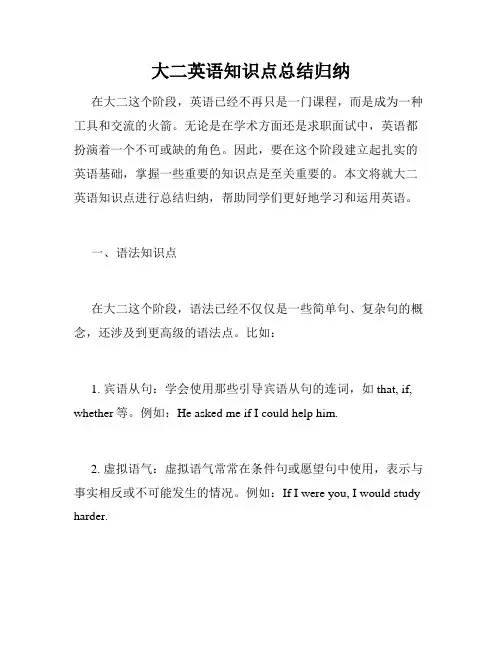
大二英语知识点总结归纳在大二这个阶段,英语已经不再只是一门课程,而是成为一种工具和交流的火箭。
无论是在学术方面还是求职面试中,英语都扮演着一个不可或缺的角色。
因此,要在这个阶段建立起扎实的英语基础,掌握一些重要的知识点是至关重要的。
本文将就大二英语知识点进行总结归纳,帮助同学们更好地学习和运用英语。
一、语法知识点在大二这个阶段,语法已经不仅仅是一些简单句、复杂句的概念,还涉及到更高级的语法点。
比如:1. 宾语从句:学会使用那些引导宾语从句的连词,如that, if, whether等。
例如:He asked me if I could help him.2. 虚拟语气:虚拟语气常常在条件句或愿望句中使用,表示与事实相反或不可能发生的情况。
例如:If I were you, I would study harder.3. 定语从句:学会使用关系代词和关系副词引导定语从句,如who, whom, whose, which, when, where等。
例如:She is the girl who won the singing competition.二、词汇知识点词汇是语言的基础,掌握一些常用词汇对于理解英语文章和表达思想非常重要。
以下是一些常见的词汇知识点:1. 同义词辨析:学会辨析一些同义词,如happy和glad, begin 和start, beautiful和gorgeous等。
掌握这些词汇的使用可以丰富自己的语言表达。
2. 习惯用语和短语:一些习惯用语和短语在口语和书面语中经常出现。
例如:break a leg (祝好运), keep up the good work (继续努力),in the nick of time (在最后关头),等等。
3. 词根和词缀:学会识别并运用一些常见的词根和词缀,可以帮助我们更好地理解和记忆一些生词。
例如:un-,dis-,re-等前缀表示否定或相反,如unhappy, dismiss, remember等。
大学英语语法重点

二、may can might could 的异同
1. May / might 事实上的可能 2. Can / could 理论上的可能
The road may be blocked. The road can be blocked. Can he tell a lie? Yes, he may. 3. Not 否定 may /might, 否定的是句子中的主动词。 They may / might not get there on time tomorrow. They can / could not get there on time tomorrow.
三、做状语 –ing/ to
1. In order to, so as to, only to, too…to.., so … as to… 2. 悬垂
Going home, mother cooked a good meal. 3. 独立主格
Weather permitting, we will go for a picnic tomorrow. 4. -ing/-ed 主动 被动
Ought to 与should 基本类似,但强调责任、义务、应该做, 或者逻辑上的必然性时用ought to
As a student you ought to study hard. I think I should try to lose some weight. It is starry tonight; it ought to be a fine day tomorrow.
3. needn’t have done Since the meeting has been canceled, they needn’t
大学英语语法 第二讲数 词
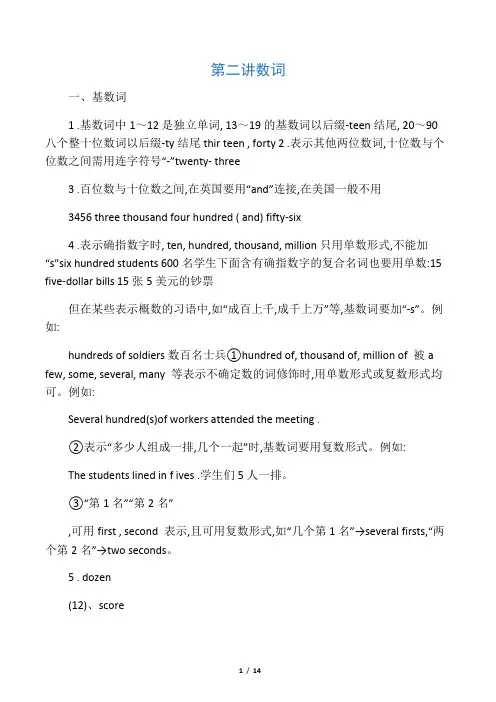
第二讲数词一、基数词1 .基数词中1~12是独立单词, 13~19的基数词以后缀-teen结尾, 20~90八个整十位数词以后缀-ty结尾thir teen , forty2 .表示其他两位数词,十位数与个位数之间需用连字符号“-”twenty- three3 .百位数与十位数之间,在英国要用“and”连接,在美国一般不用3456 three thousand four hundred ( and) fifty-six4 .表示确指数字时, ten, hundred, thousand, million只用单数形式,不能加“s”six hundred students 600名学生下面含有确指数字的复合名词也要用单数:15 five-dollar bills 15张5美元的钞票但在某些表示概数的习语中,如“成百上千,成千上万”等,基数词要加“-s”。
例如:hundreds of soldiers数百名士兵①hundred of, thous and of, million of 被a few, some, several, many 等表示不确定数的词修饰时,用单数形式或复数形式均可。
例如:Several hundred(s)of workers attended the meeting .②表示“多少人组成一排,几个一起”时,基数词要用复数形式。
例如:The students lined in f ives .学生们5人一排。
③“第1名”“第2名”,可用first , second 表示,且可用复数形式,如“几个第1名”→several firsts,“两个第2名”→two seconds。
5 . dozen(12)、score(20)、brace(1对)、head(1头)、yoke(1对牛)、gross(1箩)等表示精确数字时不用复数形式,但在表示不确切数字时要用复数two dozen bottles of beer 24瓶啤酒dozens of times 几十次①可以说a score of times 20次, a score times 20次(较普通) , a score or more 20多(人或物)。
英语二(专升本)笔记 语法,考试要点
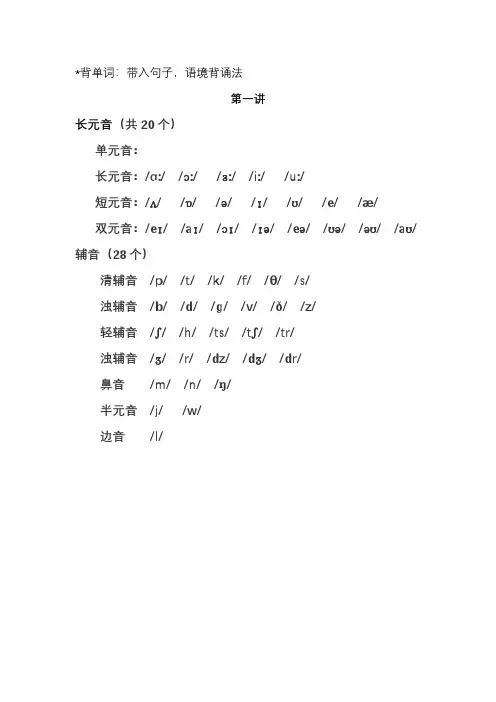
*背单词:带入句子,语境背诵法第一讲长元音(共20个)单元音:长元音:/ɑ://ɔ:/ /ɜ:/ /i:/ /u:/短元音:/ʌ/ /ɒ/ /ə/ /ɪ/ /ʊ/ /e/ /æ/双元音:/eɪ/ /aɪ/ /ɔɪ/ /ɪə/ /eə/ /ʊə/ /əʊ/ /aʊ/ 辅音(28个)清辅音/p/ /t/ /k/ /f/ /θ/ /s/浊辅音/b/ /d/ /g/ /v/ /ð/ /z/轻辅音/ʃ/ /h/ /ts/ /tʃ/ /tr/浊辅音/ʒ/ /r/ /dz/ /dʒ/ /dr/鼻音/m/ /n/ /ŋ/半元音/j/ /w/边音/l/句子成分主谓宾定状补表同句法目的句子分类简单句结构并列句复合句状语从句第二讲一、构词法1、派生词:前缀决定意思后缀决定词性2、合成词:多个词在一起,可以理解其几个次的意思总和3、转化词:词形不变,词性变(在句子中的词性不同)二、*词性(五六大题):我要代表世界(介)告诉你:行(形)动要名副其实,速(数)度要连贯(冠)有序。
感叹词啊!!!!!(一)、名词(n)1、名词的数(可数n而言)单-复(黑人英雄爱吃土豆西红柿)规则变化不规则名词2、名词的格’s/s’属格=adj= n’s意思是,……的of属格A of B (B的A)作宾语(成分):置于谓语v(动词)之后的成分做主语,表语?adj n ,adj n(二)、冠词(art)虚词-不作为成分the/a/an +nadj +n(book)(三)、代词(pron)分类人称代词:I,he,she,they(them)(主格),we,it,you,me,us,them(宾格)*物主代词:my,his,her,its,their,your,our(adj) +n 意思是……的mine,his,hers,its,theirs,yous,ours(n)反身代词:myself,yourself,herself*指示代词:this,that,those,these this,that+n单those,these+n复不定代词:some,any,every,other,something,anything adj修饰不带后置第三讲(四)、介词(prep)名词性短语前-虚词介词:in,for,on,witr,by,of,atPrep+n/v-ingPrep+n,。
现代大学英语精读第二册语法点总结
现代大学英语精读第二册语法点总结第一篇:现代大学英语精读第二册语法点总结现代大学英语精读第二册语法点总结Unit 1: the usages of future times;(将来时态)coordinating conjunctions(并列连词)Unit 2:“the way” in relative clauses(the way在关系从句中的用法)with + noun + preposition phrase/ participle /adjective construction(with结构做伴随状语)Unit 3: noun clauses(introduced by wh-words);(名词性从句)the gerund(动名词)Unit 4: appositive clause(同位语从句)indefinite pronoun: anybody/anyone;somebody / someone;everybody/ everyone;nobody/ no one;anything;something;everything;nothing(不定代词)Unit 5: the gerund;(动名词)the infinitive;(to do 不定式)attributive modifiers(定语)Unit 6:the present perfect continuous tense(现在完成进行时) the usage of the present participle phrase(现在分词)Unit 7:无(test)Unit 8:Comparative Degree(比较级:特别是the more….the more;better and better结构)Subject Complement(形容词做主语补足语:S+V+Adj.)Unit 9: with/without + noun phrase + an infinitive phrase(with、without在独立主格结构的应用)the infinitive as the subject(to do 不定式做主语)Unit 10:past participle phrase as adverbial(过去分词做定语的用法)Unit 11: part of speech(词性)Unit 12: ever/ never 的用法比较级的用法(特别是比较级前面有副词修饰;同级比较)Unit 13:V+O+C宾语补足语Could / might /should/ must +have done(虚拟语气)Unit 14:无(test)Unit 15:Parallelismsingle compound sentence(简单并列复合句)Unit 16:把疑问句改写为陈述句第二篇:大学英语精读第二册英语翻译整理1.她砰地关上门,一声不吭地走了,他们之间那场争执就此结束。
大学 英语 语法(2)
17.The course normally attracts 20 students per year, ____ up to half will be from overseas. (1998/6/70) A.in which B. for whom C. with which D. of whom 18.It is useful to be able to predict the extent ____ which a price change will affect supply and demand. A)from B)with C)to D)for
从句
一、定语从句 先行词 --The novel that I am reading is written by Thomas Hardy. 关系代词
1、关系词的用法
a.关系代词
句子成分 用于限制性或非限制性从句 只用于限制性从 句 代替人 代替物 代替人和物 主语
宾语 定语
who
which
that
4.as/but 作为连接词的使用 I have also such a book as you bought yesterday. I’d like to get the same tool as the one he is repairing the bike with. As many people as we found were taken to the hospital. As you will find out, I will never let you down. I usually take 40 winks after lunch, as is my habit.
*序数词及最高级:first/last/most等
英语二重点语法复习
综合英语(二)常考的语法为:名词单数变复数,定语从句,虚拟语气,反意疑问句,非谓语动词,时态,名词性从句,形容词副词的比较级,主谓一致,倒装等等。
下面我们把这些语法项目进行详细的有重点的讲解。
名词1. 大多数集体名词可作单数,也可作复数,如:army ,audience ,class ,committee ,crew ( 全体船员,乘务员) ,crowd ,faculty ,family ,government ,group ,orchestra ,team ,union 等。
强调整体时谓语动词用单数,强调个体时谓语动词用复数。
如:The government is paying close attention to economic development.The government are having a heated discussion on this matter.2.有些名词形式为复数,却用作单数,如:electronics( 电子学) ,mathematics( 数学) ,optics( 光学) ,politics ,statistics( 统计学), economics (经济学), physics 等。
例如: Linguistics is a difficult subject to study.3. 名词作定语时,除了man和woman要和中心词一起变成复数之外,其它修饰词不能变成复数。
例如a woman teacher ---- two women teachersa man doctor ---- two men doctorsa girl student ---- five girl studentsa boy student ----six boy students4. 复合名词的复数只把其中所包含的主体名词变成复数。
如: looker(s)-on ,runner(s)-up ,sister(s)-in-law ,editor(s)-in-chief ,passer(s)-by ,grand-child(ren) ,shoe lace(s) ,blood type(s) 等。
大学英语二级语法
大学英语二级考试语法1“How did you pay the workers?”“As a rule, they are paid by ______.”A the hourB an hourC hourD hours2Their victory is out of ______, for they’ve lost too many men.A the questionB questionC a questionD questions3 All the ______ in the hospital got a rise last month.A women doctorsB woman doctorsC women doctorD woman doctor4The experiment was____ easier than we had expected.A muchB much moreC moreD far much5 He will agree to do what you require ___________ him.A ofB toC fromD for6 Y ou _____ her in her office last Friday; she’s been out of town for two weeks.A can’t have seenB must have seenC explainedD needn’t have seen7 We have some accidents on this line, but no accidents ______ since last winter.A have occurredB occurC had occurredD are occurring8 Frankly, I’d rather you ______ anything about it for the time being.A didn’t doB don’t doC doD will not do9 Paul doesn’t have to be made ___. He always works hard.A to learnB learnC learnedD learning10 There is something wrong with my TV set, I must have it ______.A checkedB checkC doesD checking11 ____________ night, a stranger knocked at the door.A OneB AC TheD /12 I seem to have met you _________.A beforeB agoC some timeD yet13 She was glad to see her child ________.A taken care ofB take care ofC to take care ofD taking care of14 If you don’t go, ______ I.A so doB nor shallC so don’tD neither do B15 She is from Shanghai, ______ population is larger than that of any other city in China.A whichB whoseC thatD its whose16 Uncle Li used to live in the town, _____ he?A wouldn’tB weren’tC hadn’tD didn’t D17 ______ hard she tried, she did not pass the exam.A HoweverB WheneverC WhoeverD Whatever18 He told me that he would not attend the party _____ invited.A becauseB withoutC unlessD since C19 My teacher was made ______ his teaching because of his poor health.A give upB given upC to give upD giving up C20_____ is good of you to be constantly thinking of helping me.A WhatB ThisC ThatD It D21 The officer gave the order that soldiers ______ to go out at night.A should not allowB not be allowedC be not allowedD mustn’t be allowed B21_____ a reply, he decided to write a letter to her again.A Not having receivedB Not receivedC Having not receivedD Not receiving23 Mary _____ be in Paris because I saw her in town just a few minutes ago.A may notB needn’tC mustn’tD can’t D24 I have two novels. One is in English and _____ is in Japanese.A otherB the otherC other oneD another B25 The weather in China is different from____.A that in AmericaB one in AmericaC AmericaD in America26 By 1929, Mickey Mouse was as popular ________ children as Coca-Cola.A withB inC toD for27I decided to go to the library as soon as I____.A finished what I was doingB finish what I didC finished what I didD would finish what I was doing28______ find out what had happened.A Not until he woke up did heB Until he woke up heC Not until he woke up heD Until he woke up did he29 Mrs. Smith warned her daughter ___ after drinking.A never to driveB to never driverC never drivingD never drive30 The reason I plan to go is ______ if I don’t.A that she will be disappointedB because she will have a disappointmentC because she will be disappointedD for which she will be disappointed31 I haven’t read ______ of the last four chapters, so I know little about them.A anyB anythingC someD something32 The company is very famous ______ the high quality of its products.A forB inC byD with33 Mary’s score on the test is the highest in her class; she ____ have studied very hard.A mustB shouldC mayD ought to34 My uncle, Sam,______ manager of the firm.A has just been madeB is just being madeC has just madeD is just made35 It ________ this way.A used to be doneB used to doC is used to doD is used to doing36 Everything ______ if Albert hadn’t called the fire brigade.A would have been destroyedB will have been destroyedC would be destroyedD will be destroyed37_____ for the traffic jam, I should have covered fifty miles.A Had it not beenB Had it beenC It has not beenD Has it not been38 John didn’t want to risk ______ wet as he had only one suit.A gettingB to getC being gotD to be gotten39 The time will surely come ______ ordinary people could operate computers as well.A whenB whileC asD till40 Darwin did not mean to attack people’s different religious ________.A beliefsB beliefC believesD believs41 The group are waiting on ___________ plane to take off.A theirB hisC itsD her42 Which is the smallest number of the following?A One-fifth.B A quarter.C Two-thirds.D Zero point five.43 The enemy got beaten and fled _________ all directions.A inB towardC forD to44“May I borrow your bike?”“___________.”A Y es, certainly you mayB Y es, I let youC Y es, you may borrowD Y es, I lend you45 Both my parents work at the power station that __________ in my hometown recently.A has been set upB was set upC has set upD is set up46 I was ill that day, otherwise I _________ the sports meet.A would have taken part inB had taken part inC took part inD would take part in 47Many a student _________ that mistake before.A has madeB have madeC has been madeD had made48 The town is no longer ___________ it was ten years ago.A whatB thatC whichD when49 She is tall ______ her age.A atB forC inD of B50 He didn’t know French, ______ made it difficult for him to study at a university in France.A whichB asC thisD that51The professor spoke in a loud voice ______ every one of us could hear him.A so thatB soC such thatD such52The mayor felt that the police, in spite of the reports, had done ______ best.A theirB itsC hisD our53Cancer is second only ______ heart disease as a cause of death.A toB ofC withD from54Mary realized she_________A was being made fun ofB is made fun ofC was making fun ofD is being made fun of55Charles Darney insisted that he _____everything he could to make sure of Lucie’s happiness. A do B does C did D must do56I remember ______ to the zoo by my father when I was little.A being takenB takingC have been takenD to have taken57______ he was in error will scarcely be noticed by his friends.A ThatB WhatC WhichD Though58Skiing is a sport ______ goes back 4,000 years.A whose historyB and itsC its historyD and which59Biology, ______ I know nothing, seems a very dull subject.A about whichB about thatC whichD that60I’ll keep __________ eye on the baby when she is away.A anB theC oneD much61They invited the three of __________, Bob, Joe, and ________.A us…meB us…IC we…ID we…we62Which is the largest number of the following? _______.A Zero point eightB Seventy percentC Fifty percentD Two divided by three63Knowledge is more precious than ___________.A anything elseB anythingC somethingD everything64The president is ____________ a visit to China.A onB ofC inD for65I _________ stay home than go to the cinema.A would ratherB had betterC would betterD would prefer66_________ that the earth was the center of the universe.A It was once believedB People were once believedC It had once believedD People were believing67The doctor was careful __________ the patient the truth.A not to tellB to not tellC not tellingD not having told68__________ from the top of the hill, the city is just like a garden.A SeenB To seeC SeeingD Having seen69If she could sew, she ________ herself a shirt.A would have madeB madeC will makeD had made70Seldom ________ TV during the day.A do they watchB are they watchingC they have watchedD they watch71“Where is your father?”“Oh, _________”.A here he comesB here does he comeC he here comesD here comes he72There _________ a knife and fork on the table.A seems to beB seem to beC is seeming to beD are73___________ you go, you should bear the task in your mind.A WhereverB WhereC WhateverD However74We all got up early __________ we might start at six.A in order thatB in order toC soD so as to75______ you return those books to the library immediately you will have to pay a fine.A UnlessB IfC UntilD Provided76After ten years, all these youngsters became_____.A grown-upsB growns-upC grown-upD growns-ups77Y our application will be considered ______ your file is completed.A as soon asB as quickly asC as fast asD as early as78The family never agree about ______ shares of the property.A theirB itsC herD his79The room is in terrible mess; it _________ cleaned.A can’t have beenB shouldn’t have beenC recoveryD wouldn’t have been80Up till then we ______ half the distance.A had only coveredB coveredC would only coverD would be only covered81When I called you this morning, nobody answered the phone.____?A where were youB where have you been toC where did you goD where have you been82 He was just about to jump up when he felt something ______ near his feet.A movingB moveC to moveD moved83_____ is worth doing at all is worth doing well.A WhateverB ThatC WhicheverD However84 Now we may be able to say ______ between music and noise.A what the difference isB the difference is whatC what is the differenceD that what the difference85Only when thousand of flowers bloom together ________ here.A can spring be consideredB could spring be consideringC spring will be consideredD spring can be considered86Y ou won’t succeed _________ harder.A unless you workB if you will workC unless you don’t workD if you won’t work87Y ou may take anything useful __________.A you wantB what you wantC you want themD which you want88We must try to avoid these mistakes ______.A being repeatedB repeatingC be repeatedD repeat89“Would you mind opening the window?”“______.” DA Y es, you may openB Y es, pleaseC No, you can’t open nowD No, of course not 90How ______ from here to the library?A far is thereB long is itC far is itD long it is C。
- 1、下载文档前请自行甄别文档内容的完整性,平台不提供额外的编辑、内容补充、找答案等附加服务。
- 2、"仅部分预览"的文档,不可在线预览部分如存在完整性等问题,可反馈申请退款(可完整预览的文档不适用该条件!)。
- 3、如文档侵犯您的权益,请联系客服反馈,我们会尽快为您处理(人工客服工作时间:9:00-18:30)。
虚拟语气 (Subjunctive mood)
I. 句子 = 主语 + 谓语动词 II. 谓语动词: I) 人称(person)、数(number):单、复数、第 一、 第二、第三人称。 I am a teacher and they are students. 我是一个老师,他们是学生。 She studies English hard and we love her very much. 她学习英语很努力,我们都喜欢她。
2. 祈使语气(Imperative mood):表示说话人通过谓语动词 对第二人称发出的指示、命令、请求。祈使语气没有时 态。 Sit down, please. 请坐下。 Be careful. 小心点。 Don’t be careless. 不要太粗心。 You get out of here! 你给我滚开!
1. She urges/urged/will urge that we/you/he (should) accept the post. (宾从) 她极力主张我们/你/他接受这个职位。 2. It is/was/will be necessary that we/you/he (should) start at once. (主从) 我们/你/他有必要马上开始。 3. His suggestion is/was/will be that Tom (should) study hard. (表从) 他的建议是汤姆应该努力学习。 4. His suggestion that Tom (should) study hard is/was/will be correct. (同从) 他关于汤姆应该努力学习的建议是正确的。
3. 完成体和进行体的结合叫做完成进行体(Prefect progressive aspect = have been doing)。 They have been hearing the report since 8 o’clock. 从八点开始他们一直在听报告。 By the end of last year he had been studying English for two years. 到去年年底,他一直学了两年英语。 由此可见,动词进行体和完成体必须借助助动 表示,而动词本身并无这种形式。
IV) 将来时间(Future time):由于英语中 表示将来和过去将来必须借助情态助动词、 半助动词或其他形式,这样表示将来时间 的方式很多,而动词本身并无表示将来的 形式。英语里表示将来动作或状态的方法 有:
1. 情态动词(表示说话人对某种行为或状态 的看法或态度,但不能单独使用的动词) shall/will (should/would) + do (注: shall/will [举例说明区别] 本身是情态动 词,表示将来意义仅是它们诸多情态意义 中的一部分,如果只把shall/will + do 结 构看作将来时态,而把其他表示将来时间 的形式排除在外,这不仅不符合英语的语 言实际,也不利于教学,所以我们采取了 英语动词没有将来时态的观点。)
1) If he/I/we knew(与动词过去式巧合一致的一般式) it, he/I/we would tell(虚拟语气未过式的等同式)you.
如果他/我/我们知道此事,他/我/我们就告诉你。(表
示说话人说话的那时那刻假设行为正在发生,暗示说话 人实际不知道此事,因此无法告诉你。)
2) If I were/was not invited, I would not go.
2.已过式:表示说话人说话的那时那刻,假设行 为已经发生。在If引导的非真实性条件状语从句 中用与动词过去完成式巧合一致的已过式,主句 中用虚拟语气已过式的等同式would (not) have + done。因此,可变虚拟语气已过式里也没有人称、 数、时态和体貌变化。例如: 1)If I had known (与动词过去完成式巧合一 致的已过式)it, I would have told(虚拟语气已过 式的等同式)you.
5. May Chairman Mao live long. → Long live Chairman Mao! (表示愿望) 祝毛主席万寿无疆! II) 可变虚拟语气(Inflectional subjunctive): 1. 未过式:表示说话人说话的那时那刻,假设行 为正在发生或还未发生。在If引导的非真实性 条件状语从句中用与动词过去式巧合一致的一 般式 (be 除外,用were, 非正式文体中用was), 主句中用虚拟语气未过式的等同式would (not) + do。因此,可变虚拟语气未过式里也没有人 称、数、时态和体貌变化。例如:
2. 表示动作或状态已经完成的形式叫做完 成体(Perfect aspect = have + done)。 He has studied English for two years. 他已经学了两年英语。 He had been a worker for three years before he entered the school. 他入学前已经当了三年工人。
3. 虚拟语气(Subjunctive mood):指说话人用谓 语动词表示与事实相反或可能相反的愿望、假 设、怀疑、想象、建议、推测等的一种形式。 虚拟语气也是没有时态的。 III. 虚拟语气: I) 不变虚拟语气(Non-inflectional subjunctive):不 变虚拟语气中的所有谓语动词(包括be在内) 都用原形动词表示,没有人称、数、时态和体 貌变化。主要用在表示愿望、建议、要求、规 定、重要性、必要性、命令等意义的名次从句 (主语从句、表语从句、同位语从句、宾语从 句)中。例如:
VI)语气(Mood):语气是动词用来表示说话人对动词表 示的动作或状态的看法或态度的一种形式。 1. 陈述语气(Indicative mood):指说话人认为 动词表 示的动作或状态与事实有关。只有陈述语气有时态。 He studies hard. 他努力学习。 He did not study hard. 他过去学习不努力。 Does he study hard? 他学习努力吗?
Байду номын сангаас
III) 体貌(Aspect):动词表示动作或状态进 展情况的形式称为动词的体貌。 1. 表示动作或状态正在进行的形式叫做进 行体(Progressive aspect = be + doing)。 He is studying English. 他正在学习英语。 He was writing an article when I saw him yesterday. 昨天我看见他的时候,他正在写文章。
II) 时态(tense):时态是表示时间区别的谓语 动词的变化形式。从这个意义上讲英语仅 有现在时(Present tense)和过去时(Past tense)两种形式。 I was a teacher and they were students. 我是一个老师,他们是学生。 She studied English hard and we loved her very much. 她学习英语很努力,我们都喜欢她。
如果我没受到邀请,我是不会去的。(表示说话人说话
3) 在Wish 后的宾从中用可变虚拟语气未过式:
的那时那刻假设行为还未发生,暗示实际“我”会受到 邀请,因此“我”会去的。)
I wish/wished/shall wish that it were/was spring all the year round. 要是一年四季都是春天就好了。(表示说话人在说话的 那时那刻,假设事情正在发生。)
如果我当时知道此事的话,我早就告诉你了。(表示说话
人说话的那时那刻假设行为已经发生,暗示实际当时说话 人不知道此事,因此没有告诉你。)
2) If I had not been invited, I would not have gone.
如果我当时没受到邀请,我就不去了。(表示说
话人说话的那时那刻行为已经发生,暗示实际 “我”受到了邀请,因此“我”已经去过。)
We shall go to the countryside next week. 下星期我们要到农村去。 Some foreign guests will come and visit our university tomorrow. 明天有几个外宾要来参观我们学校。 2. 半助动词 be going to do We are going to build up a power station here. 我们打算在这儿修一座发电站。 3. 一般现在时表示将来 Today is Monday, and tomorrow is Tuesday. 今天是星期一,明天星期二。
4. be about to do 表示即将发生的动作或状态 The film is about to begin. 电影马上就要开始。 5. be to do 可以表示按计划、安排等将要发生的动作 They are to be married soon. 他们快要结婚了。 6. be going to A 表示位置移动的动词进行体表示将来 Mr Smith is leaving China in a few weeks. 史密斯先生几个星期后就要离开中国了。 I’m going to Qingdao for the summer holiday. 我要到青岛过暑假。
3) 在Wish 后的宾从中用可变虚拟语气已过式: I wish/wished/shall wish that I had not heard it. 要是我听说过此事就好了。(表示说话人说话的那 时那刻,假设事情已经发生。)
